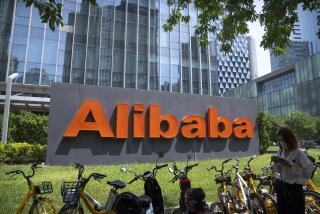Alibaba shares jump on better-than-expected earnings
Chinese e-commerce powerhouse Alibaba’s second-quarter net income topped expectations as revenue surged on mobile growth.
The news reassured investors about how Alibaba is fairing in the uncertain Chinese economy. Its shares jumped more than 8 percent in premarket trading.
In a call with analysts, Joe Tsai, the executive vice chairman of Alibaba, said he doesn’t think the current macroeconomic environment will affect consumption patterns, pointing out that the individual Chinese consumer is “very liquid” with a high savings rate.
“There’s lots of savings, lots of liquidity, so a temporary setback in the macro economy is not going to affect consumption patterns in a fundamental way,” he said.
Mobile revenue from Alibaba’s shopping platforms such as Taobao Marketplace and Tmall.com was a strong point. It more than doubled to 10.52 billion yuan ($1.66 billion), or 61 percent of total retail revenue.
“Alibaba deserves credit for taking a lead in terms of shifting its proposition and platforms firmly away from PC to mobile-based selling,” said Neil Saunders, CEO of research firm Conlumino. Heavily promoting the mobile app for its Taobao marketplace helped the strong mobile performance, he said, including a surge in shopper numbers from lower tier cities and more rural areas, where its more common to use mobile devices for shopping.
Net income after paying deferred dividends jumped to 33.75 billion Chinese yuan ($3.58 billion), or $1.40 per share, compared with 2.98 billion yuan in the prior year quarter. Excluding one-time costs such as a compensation expense, net income totaled 57 cents per share. That topped analyst expectations of 54 cents per share, according to FactSet.
Revenue rose 32 percent to 22.17 billion yuan ($3.49 billion) from 16.83 billion yuan. Analysts expected revenue of $3.35 billion. Gross merchandise volume, a closely watched metric that conveys the total sales dollar value of all products sold via Alibaba’s platforms, rose 28 percent to 713 billion yuan ($112 billion).
The report comes ahead of the popular Chinese shopping holiday “Singles Day,” similar to Black Friday in the U.S., on Nov. 11. The company said in a call with analysts that it plans to make it a global event with countries around the world offering specials on Alibaba’s platforms.
Alibaba went public in the U.S. in September 2014 and investors, seeking to tap into the rapidly growing Chinese middle-class, scrambled to buy shares. Alibaba’s e-commerce platforms, including Taobao and Tmall, make up 80 percent of Chinese e-commerce. But since then China’s growth has slowed and domestic markets have become volatile. And Alibaba is facing rising competition from rivals like Tencent, which owns the popular messaging site WeChat and JD.com.
The company has also faced criticism from its own government and U.S. regulators about counterfeit goods found on its selling platforms. But Alibaba said Tuesday a previously announced SEC inquiry into Alibaba’s interaction with one of its Chinese regulators, the State Administration for Industry and Commerce, had been closed with no enforcement action recommended.
Shares jumped $6.40, or 8.4 percent, to $82.75 in premarket trading about an hour before the market open. The stock is down about 27 percent since the beginning of the year.
More to Read
Inside the business of entertainment
The Wide Shot brings you news, analysis and insights on everything from streaming wars to production — and what it all means for the future.
You may occasionally receive promotional content from the Los Angeles Times.










